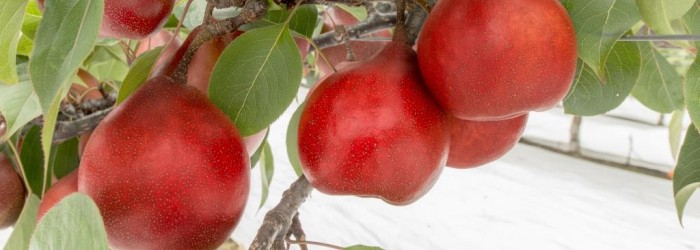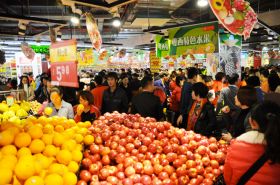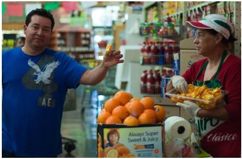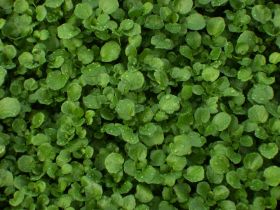Horticulture news
Food retailer toasts a successful financial year, and also plans to open 40 new stores in 2014, creating 1,250 jobs

Iceland Foods is toasting a successful year of trading after generating group sales of £2.71 billion, up 2.7% on the previous year.
The UK supermarket chain posted the results – largely driven by new store openings and group expansion – through its holding company Topco for the 52-week period to the end of March 2014.
Like-for-like sales in the company’s last financial year, though, were flat, and adjusted EBIDTA fell 10.6% to £202 million, reflecting “major investment for sustainable future growth in the UK and abroad.”
A spokesperson for Iceland Foods also confirmed that the Malcolm Walker-led business is on track to open 40 new stores this year, creating 1,250 jobs in the process.
Walker said: “This has been a year of major investment for Iceland both at home and overseas. In the UK we accelerated our expansion programme with the opening of 46 new stores and also rolled out our online shopping offer to 280 stores.
“Overseas we began to serve important new export markets in South Africa and the Middle East, acquired the formerly franchised Iceland stores in the Republic of Ireland and opened two additional stores in the Czech Republic. We were also delighted to regain our title as the Best Big Company To Work For in the UK.”
During its most financial year, the business reduced its net debt from £875.2 million to £805.1m.
At year’s end, Iceland Foods operated 844 stores in the UK and internationally, compared to 793 a year earlier, and currently boasts a workforce of 25,000 people.
Australasian fresh produce company signs deal with Prevar to grow and market new trademarked pear cultivar

New Zealand-based topfruit breeder-marketer Prevar has signed an agreement with the Australasian company Freshmax to develop sales of PremP009, a new pear set to be grown in Australia and marketed globally as Piqa Boo.
Bred by Plant & Food Research, the new cultivar is the first of a number of new cultivars expected to be released in the coming years and sold under the Piqa brand.
It combines characteristics from European, Japanese and Chinese pears, apparently giving the fruit a crisp, juicy texture and refreshing flavour, as well as exceptional storage and shelf-life.
Large-scale plantings are due to begin in Australia and New Zealand this year, with the first commercial harvest expected in 2016.
Freshmax Group chief executive Ross Kane welcomed the deal: “We believe there are excellent commercial opportunities for these new fruits in Australia and in Asian export markets, and are excited for their future.”
According to Kane, the pear category is in need of new and better varieties, and the fruit emerging from the Piqa programme could be a “significant catalyst” for that rejuvenation.
“The Piqa Boo brand cultivar is visually striking in both colour and shape and has a very appealing crisp texture and flavour, resulting in a very broad appeal to consumers,” he added.
In good shape
Piqa Boo has a short pyriform shape, bright block red colour and small brown lenticels – the small pores seen on the surface of many apples and pears that give them a distinctive mottled look.
It is also said to have exceptional storage and shelf-life, developing a flavour characteristic of the Williams pear variety during coldstorage and offering the same ready-to-eat convenience of apples.
“These fruits should also be well received by younger consumers,” said Andrew Maughan, national business manager for Holman Fresh, part of Freshmax and licence manager for the group.
“We have already assembled a very committed and entrepreneurial group of pear growers to commence the planting of this selection. Anyone else who wishes to participate in Australia should contact me.”
For Prevar, teaming up with Freshmax offers it a great opportunity to make its vision for Piqa a reality, suggested chief executive Brett Ennis.
“The essential brand message for Piqa fruit is ‘delightfully exotic’, which captures the best elements of western and eastern pears fused together in this new range of fruits,” he said. “We look forward to the range of opportunities this new brand will create.”
The agreement with Freshmax represents a major step in terms of establishing a supply base for Piqa Boo, with Prevar having already signed an exclusive deal with UK importer Worldwide Fruit to sell its new range in the country.
British Flowers Week, which showcases the best product and floral design our island has to offer, starts today.

The nation may be glued to the World Cup, but there’s another reason to be cheering on the UK this week, and that’s thanks to the growing list of fashion-forward florists that are taking the industry by storm.
British Flowers Week, championed by New Covent Garden Flower Market, is a celebration of the growers and designers working hard to promote UK cut flowers.
Over the next five days florists such as Okishima & Simmonds, McQueens, Euphoric Flowers, Hybrid Flowers, and Simon Lycett will reveal specially commissioned designs using only British product.
A NCGM spokeswoman said despite UK sales of cut flowers being worth some worth £2.2 billion, it is estimated that just 10% are grown in the UK.
“Many British growers are fighting international competition with rising costs and higher land values making it even harder to compete,” she added.
“But now, British flowers and foliage are enjoying a long-awaited resurgence in popularity. Buyers are increasingly demanding more locally grown produce to celebrate the seasons and support British growers. Often scented, British flowers have a natural charm, beauty and just-picked freshness that make them the florist’s favourite.
“New artisan growers have sprung up around the country, and campaigners such as Rachel de Thame, Sarah Raven, the Flowers from the Farm movement and New Covent Garden Flower Market, are leading the call to support British cut flower growers.”
For more information on events go to www.newcoventgardenmarket.com
McCartney-backed Meat Free Monday welcomes its fifth anniversary by celebrating diverse support and launching new merchandise

Meat Free Monday, the global celebrity-backed campaign to promote one day of not eating meat a week, is celebrating its five year anniversary today.
The campaign, which is headed by Paul, Stella and Mary McCartney, is celebrating the occasion by celebrating the diversity of its global supporters and launching new tee shirts.
It has also started an Instagram page to encourage followers to post creative meat-free meals, using the hashtag #MeatFreeMonday.
Since its launch in 2009 the campaign has gained global support from the Norwegian military, the Croatian ministry of Agriculture, the Hong Kong airport authority and Kuwait’s ministry of health.
It is known in over 35 countries and 23 languages, including Lunes Sin Carne in Mexico, Meatless Monday in the USA and Luntiang Lunes in the Philippines.
Ex-beatle and Meat Free Monday campaigner, Paul McCartney, said: “Thank you to everyone who supports the campaign. Eating more fruit and veg, and less meat, is good for our health and good for the planet. With diet-related diseases on the rise, Meat Free Monday is more important now than ever.”
McCartney is joined in the project by his two daughters, photographer Mary and high-fashion designer Stella.
It has also been backed by a host of celebrities including Gwyneth Paltrow, Leona Lewis, Kevin Spacey, Jamie Oliver, Joanna Lumley and Sir Richard Branson.
“Happy fifth birthday Meat Free Monday! It’s brilliant to see so many people embracing MFM and enjoying a break from meat at least once a week. I have noticed meat-free food options are more widely available than ever – flavourful and imaginative,” said Mary McCartney.
Stella McCartney took the chance to thank supporters of the campaign and emphasise the achievability of not eating meat once a week.
She said: “One day a week without meat is achievable for us all and we know you can do it to have better health and a better environment.”
The Meat Free Monday campaign was founded as a result of increasing evidence to suggest that eating meat is not environmentally or economically sustainable.
It uses statistics such as the Food and Agriculture Organization (FAO)’s estimation that global meat production accounts for nearly 15% of all greenhouse emissions.
The campaign has focused on both consumer and wider political aspects: it has published a Meat Free Monday Cookbook and has issued a plea with the European Parliament to take the issue of meat reduction seriously.
Group D: Mark Newton of Freshtime goes head to head with Federico Milanese of Centro Servizi Ortofrutticoli
Fruitnet.com’s partner publications FRESH PRODUCE JOURNAL (FPJ), EUROFRUIT, ASIAFRUIT and AMERICAFRUIT have teamed up to publish a series of special interviews to coincide with the FIFA World Cup, featuring a member of the fresh produce industry from each of the 32 nations involved in the tournament.

Today, it’s Mark Newton from English company Freshtime and Federico Milanese of Italian firm Centro Servizi Ortofrutticoli, ahead of their national teams’ Group D clash later today (14 June):
What is your firm’s world-beating service or product?
Mark Newton: Our goal is to turn quality produce into delicious salads, snacks and deli fillers. We take extra time to make sure we use the freshest ingredients and we always score top marks from our customers!
Federico Milanese: We have lots of excellent products, but one of our world-beaters is kiwifruit, for which we are the leader in terms of production. We’re promoting kiwifruit to an increasing number of markets around the world in regions even further afield such as Asia, North America and the Middle East.
What does the World Cup mean to people in your country?
MN: Nearly half a century after we last won a World Cup England fans have learned to temper their expectations. But we all love a big tournament and when we English get the chance to fire up the barbecue and watch a big match sales of salads tend to go through the roof!
FM: For Italy, the World Cup is a unique event and it has a unique impact on the market. It’s very important in terms of food consumption and, although I haven’t noticed much so far in terms of promotional tie-ins for fresh fruit and vegetable products, there could conceivably be a greater level of interest for exotic produce including Brazilian fruit. During the World Cup there’s usually a significant increase in the volume of fresh convenience products consumed.
How do you think your national team will fare in Brazil?
MN: We’re in a tough group and the climate won’t help us, but Roy Hodgson has selected a fresh young squad with some exciting attacking talent so there’s room for cautious optimism. Prediction: Finish second in group, and then reach the quarter-finals before losing to hosts Brazil.
FM: I’m more concerned about the first group stage than I am about the latter stages of the tournament. Assuming the Azzurri make it to the second stage, we could do very well.
Major retailers distancing themselves from CP Foods following allegations supply chain is linked to slavery
Thai company Charoen Pokphand Group, a major food conglomerate involved in the produce breeding, processing and grocery sectors, is under fire following allegations that its seafood supply chain is linked to illegal labour practices.

As with the recent horsemeat scandal in Europe, the scandal looks set to cast doubt over the integrity of international food retail supply chains as well as the CSR programmes that suppliers involved in the grocery trade are nowadays so keen to publicise.
A six-month investigation by the Guardian revealed that CP Group’s Thai-based subsidiary CP Foods buys fishmeal to feed its farmed prawns from suppliers linked to Thai fishing boats that are allegedly manned with slaves.
CP Foods released a statement Wednesday saying it denounced slavery and will use its commercial weight to influence the Thai government to act on the matter, rather than walking away from the country’s fishing industry.
CP Foods distributes, both directly and indirectly, to major retailers including Walmart, Carrefour, CostCo, Tesco and Aldi, who have been quick to distance themselves from the allegations, condemning slavery and announcing social audits. Carrefour has condemned the allegations, releasing a statement that said: “As a precautionary measure, Carrefour has decided to immediately suspend its direct or indirect purchases from this company until light has been shed on the situation.”
As the US prepares its 2014 Trafficking in Persons report, the Guardian reported that the US may downgrade Thailand’s ranking to tier three, setting it alongside North Korea and Saudi Arabia for apparently failing to address human trafficking issues. Such a move would potentially lead to restrictions on foreign aid from the US and the World Bank.
CP Foods is a subsidiary of CP Group, an agribusiness conglomerate that operates Siam Makro stores in Thailand as well as Lotus SuperCenters in China.
The group’s Chia Tai unit is involved in the research, development and supply of vegetable and flower seeds.
In 2012, CP Foods opened a Melbourne office, supplying frozen foods to Woolworths, CostCo, 7-Eleven and some IGA stores

Like-for-like 12-week sales at Justin King-led retailer down for second quarter in a row, as Mike Coupe prepares to become CEO
There has been no dramatic turnaround in sales fortunes for outgoing Sainsbury’s CEO Justin King: for the second quarter in a row, the retailer has seen its share of the market fall.
Like-for-like sales in the 3 months to 7 June 2014 were shown to be more than one per cent lower compared with a year earlier, with the results following on from the first decline in sales at Sainsbury’s in eight years reported in March.
The retailer is currently preparing for Mike Coupe, the company’s group commercial director, to take over as chief executive from King, who has been in the post for the last ten years.
King said: “Lower food price inflation and reduced fuel prices are a welcome respite to customers’ finances, but they continue to spend cautiously, leading to industry growth in the quarter being the slowest in a decade.”
Sainsbury’s latest fall in sales comes only a short time after Tesco revealed it also saw a like-for-like sales slump for the second quarter of the year.
Citrus committee is ramping up efforts to open Chinese and Brazilian market
Chilean citrus exports are set to fall in 2014 due to the effects of last September’s freeze and a drought in the IV region, which has cut production across all main varieties.

Monserrat Valenzuela of the Chilean Citrus Committee told Fruitnet that the biggest drop is likely to be seen in clementines with shipments forecast to fall by 13% to 27,705 tonnes. Orange exports are expected to be down 9% at 64,130 tonnes, while mandarin shipments are set to rise by 5% to 33,233 tonnes.
Although lemon production is also down, the committee said exports would most likely remain similar to last season as companies seek to take advantage of undersupplied international markets.
The US is the main destination for Chilean citrus, absorbing almost 80% of total export volumes. Asia – principally Japan – accounts for another 10%, while a further 6% is sent to Europe. Valenzuela said one of the committee’s top priorities this season is to gain authorisation to ship to China and Brazil.
Watercress tops list aimed at defining the nutritional density that makes a “powerhouse” fruit and vegetable
Superfoods have been the rage for several years – the things that, if we eat them, are said to protect us from a variety of health issues.

Many a food item has had its 15 minutes as ‘the’ superfood, but a new list looking to define what exactly “powerhouse” fruit and vegetables (PFV) are put watercress at the top of the list.
The research, from the United States of America’s William Paterson University, rated 47 different fruits and vegetables on their compilation of fibre, calcium, protein, potassium, and vitamins, among other things.
Researchers developed and validated a classification scheme defining PFV as foods providing, on average, 10% or more daily value per 100 kcal of 17 qualifying nutrients.
Of the 47 foods studied, 41 satisfied the powerhouse criterion and were more nutrient-dense than were non-PFV, providing preliminary evidence of the validity of the classification scheme.
The researchers’ top 30 is as follows:
1. Watercress // 2. Chinese cabbage // 3. Chard // 4. Beet greens // 5. Spinach // 6. Chicory // 7. Leaf lettuce // 8. Parsley // 9. Romaine lettuce // 10. Collard greens // 11. Turnip greens // 12. Mustard greens // 13. Endives // 14. Chives // 15. Kale // 16. Dandelion greens // 17. Red peppers // 18. Rocket // 19. Broccoli // 20. Pumpkin // 21. Brussels sprouts // 22. Spring onions // 23. Kohlrabi // 24. Cauliflower // 25. Cabbage // 26. Carrots // 27. Tomatoes // 28. Lemons // 29. Iceberg lettuce // 30. Strawberries
The six that didn’t make the cut were raspberries, tangerines, cranberries, garlic, onions, and blueberries.